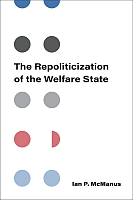The Repoliticization of the Welfare State
External Review of Whole Manuscript
Author(s)
McManus, Ian P.
Collection
Knowledge Unlatched (KU)Language
EnglishAbstract
The Repoliticization of the Welfare State grapples with the evolving nature of political conflict over social spending after the Great Recession. While the severity of the economic crisis encouraged strong social spending responses to protect millions of individuals, governments have faced growing pressure to reduce budgets and make deep cuts to the welfare state. Whereas conservative parties have embraced fiscal discipline and welfare state cuts, left-wing parties have turned away from austerity in favor of higher social spending. These political differences represent a return of traditional left-right beliefs over social spending and economic governance.
This book is one of the first to systematically compare welfare state politics before and after the Great Recession, arguing that a new and lasting post-crisis dynamic has emerged where political parties once again matter for social spending. At the heart of this repoliticization are intense ideological debates over market regulation, social inequality, redistribution, and the role of the state. The book analyzes social spending dynamics for 28 countries before and after the crisis. It also includes in-depth country case studies representing five distinct welfare state types: Germany, the United Kingdom, Sweden, Spain, and the Czech Republic.
Keywords
Political Science; Political EconomyDOI
https://doi.org/10.3998/mpub.12140242ISBN
9780472902866Publisher
University of Michigan PressPublisher website
https://www.press.umich.edu/Publication date and place
2022Grantor
Imprint
University of Michigan PressClassification
Political economy


 Download
Download